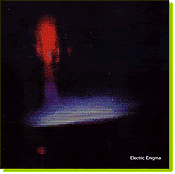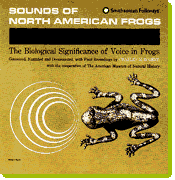
In the '70s, every self-respecting geek had a rack of sound effects records -- but if you've been checking out Funky Porcini sides, you'll know there's no mileage left in car crash noises. Instead, off-beat musicologists are turning to the natural rhythm method of field recordings.
One of the leading aural Attenboroughs is Chris Watson. He used to be the guy dropping strange tape samples into Cabaret Voltaire's proto-electronica before he split to become a TV sound guy. Now he's brought all that experience to bear on the creation of two recordings. Stepping into the Dark (Touch) was the first, a suite of sonic snapshots of out-of-the-way locations. While listening to the plains of Kenya can be a bit of a newagey blissout, Watson's chasing a different angle -- he's using tape to catch the soul of the place.
The follow-up, Outside the Circle of Fire (Touch), takes another tack, presenting animal noises from a lot closer up than I ever intend to be. The results are, to quote the sleeve notes: "the sounds of secret languages" and "signals that are beyond our reach." They're as spooky as anything cooked up by Pink Floyd in their trippy days. And they evoke an unusual response. I've heard other musicians describe the records as "pure," as if Watson had started with a mix and then just zoomed in on the samples, and nothing but the samples.
 Stephen P. McGreevy is another electronics enthusiast who seems to have not so much lost the plot as abandoned it. He's a radio ham who stopped listening to his "breaker, breaker" pals and tuned to the crackle channel in between them. Now he walks the earth carrying a big metal stick and wanders into electrical storms. His VLF (Very Low Frequency) recordings of the aurora borealis were collected on Electric Enigma (Irdial), and what they sound like is the great night spirits of the North stopping their conversation to swoop about your head.
Stephen P. McGreevy is another electronics enthusiast who seems to have not so much lost the plot as abandoned it. He's a radio ham who stopped listening to his "breaker, breaker" pals and tuned to the crackle channel in between them. Now he walks the earth carrying a big metal stick and wanders into electrical storms. His VLF (Very Low Frequency) recordings of the aurora borealis were collected on Electric Enigma (Irdial), and what they sound like is the great night spirits of the North stopping their conversation to swoop about your head.
For Watson and McGreevy, it all seems like a good excuse to travel the world, just as Alan Lomax did in the '30s, when he traversed the American south, recording folk songs for the Library of Congress. With similar ethnographic zeal, EllipsisArts are grabbing indigenous music and bringing out opulent packages, with liner notes providing a dab of history and sense of place.
Erik Davis reckons there's a deeper purpose. He thinks that tourism has exhausted the power of the image from foreign lands, and the only fresh and personal thing you can bring back is a sound. Listen to Loren Nerell's Indonesian Soundscapes (Soleilmoon) and feel the truth of it. The call to prayer before dawn breaks, the rattle from a Gamelan maker's showroom, the background noise in the airport lounge -- it's a series of sonic snapshots that's way preferable to home movies of the holidays. The cuts that really crack me open are the 10 minutes of tropical rainfall -- and, of course, the frogs.
 The one CD that's really taking off amongst the college kids is the old Smithsonian Institute recording from the 50's, Sounds of North American Frogs (Folkways). Maybe it was the damn Budweiser commercial that set them off, but UC Berkeley's KALX playlists show it in constant rotation. What you get is 92 different sets of frogs giving it up in a frenzy of herpetological horniness (you think they're croaking for their health?). In between, the set is MC'd by Charles M. Bogert (L.L.D.) sounding for all the world like a hillbilly intellectual.
The one CD that's really taking off amongst the college kids is the old Smithsonian Institute recording from the 50's, Sounds of North American Frogs (Folkways). Maybe it was the damn Budweiser commercial that set them off, but UC Berkeley's KALX playlists show it in constant rotation. What you get is 92 different sets of frogs giving it up in a frenzy of herpetological horniness (you think they're croaking for their health?). In between, the set is MC'd by Charles M. Bogert (L.L.D.) sounding for all the world like a hillbilly intellectual.
There's a sad thought buried in the liner notes that, for me, tells the real reason that we're oversampling the world for digital playback. "This release comes at a time when an alarming decline of many amphibian species is encountered around the world, giving added importance and urgency to our understanding of these species." That's right, thanks to global warming, frogs are on the way out. Who knows how long it's going to be before we bugger up Chris Watson's sacred spaces, or even interfere with the great Northern ghosts of the aurora borealis?
It's not just the undead, or even the world of commerce -- in order to survive, even Mother Nature may have to up sticks and join the virtual world on the other side.
Paul McEnery wants to be the Omega Man.
